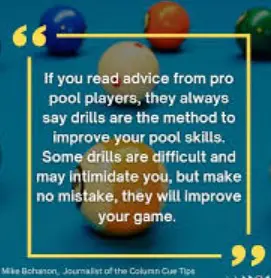Top Ten To Do List for Best Ways To Practice

To improve at any skill or subject, practicing effectively is key. While the best approach may vary depending on the specific skill or goal, here are general strategies to ensure your practice is productive:
1. Define Clear Goals
- Why it helps: Knowing what you’re working toward ensures your practice is focused.
- Example: Instead of “get better at drawing the ball,” set specific goals like “complete 5 progressive draw drills and record score to improve.”
2. Break It Down
- Why it helps: Large tasks can feel overwhelming, so breaking them into smaller steps makes progress manageable.
- Example: If you’re learning a pattern, focus on one aspect at a time (try same shot multiple times and verify grouping, mark progress and review each shot and break it down to best paths).
3. Use Deliberate Practice
- Why it helps: Focus on challenging areas rather than only practicing what you’re already good at.
- Example: A musician might practice difficult scales or transitions instead of playing entire songs they already know well. Practice your weak areas in pool and build upon it with coaching.
4. Get Feedback
- Why it helps: Constructive feedback helps identify mistakes and areas for improvement.
- Example: If you’re learning to a new skill shot or changing one fundamental mechanic, have someone review your work or use tools to analyze it.
5. Schedule Regular Practice
- Why it helps: Consistency builds habits and reinforces learning over time.
- Example: Set aside 30 minutes every day for focused practice rather than cramming once a week long session.
6. Use the Right Tools and Resources
- Why it helps: The right materials can make your practice more effective and enjoyable.
- Example: Use online tutorials, apps, or community forums relevant to your goal.
7. Track Progress
- Why it helps: Monitoring your improvement keeps you motivated and helps identify what works.
- Example: Keep a journal, use apps, or create a checklist to see how far you’ve come.
8. Mix It Up
- Why it helps: Varying your practice keeps it engaging and allows you to apply your skills in different contexts.
- Example: If you’re practicing for an hour, try delivering a some practice to a mirror for mechanics, recording yourself, or presenting to a friend to watch you for feedback.
9. Rest and Reflect
- Why it helps: Taking breaks prevents burnout, and reflecting solidifies what you’ve learned.
- Example: After a practice session, ask yourself: “What went well? What needs improvement?”
10. Stay Patient and Persistent
- Why it helps: Mastery takes time, and progress may not always be linear.
- Example: Celebrate small wins and remind yourself why you started.
If you let me know the specific skill or area you’d like to practice, I can provide more tailored advice!
